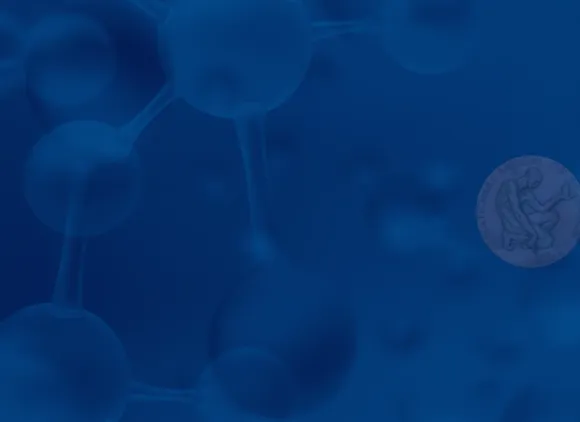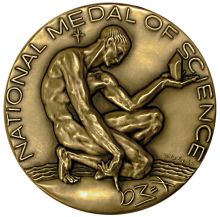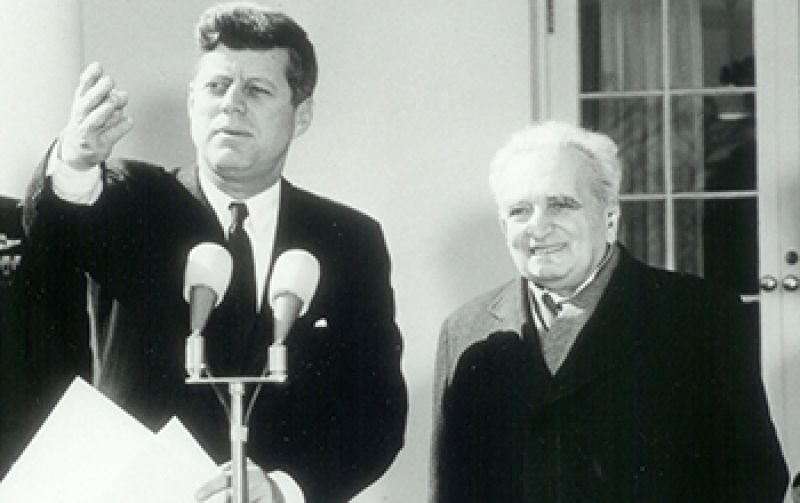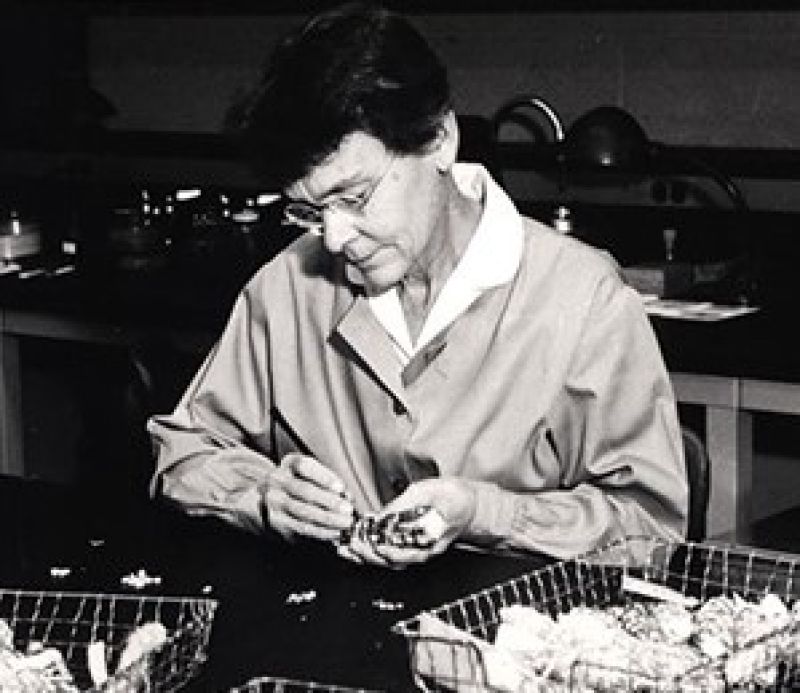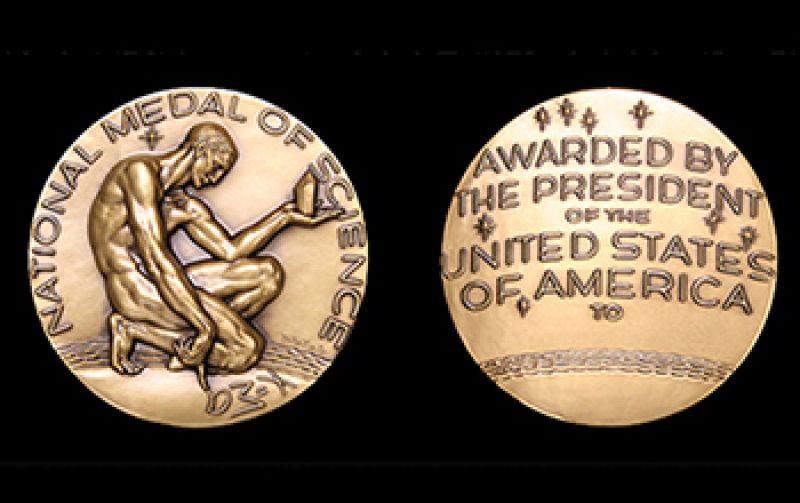News
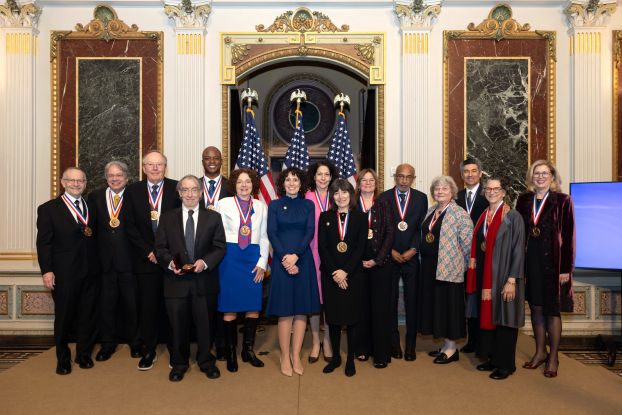
NSF congratulates recipients of the prestigious National Medal of Science and National Medal of Technology and Innovation awards
January 7, 2025
President Joe Biden revealed the newest honorees of the recipients of the National Medal of Science and the National Medal of Technology and Innovation. The laureates were honored during a prestigious ceremony at the White House last Friday. These esteemed awards celebrate groundbreaking contributions that have advanced knowledge, driven progress and tackled the world's most critical needs while underscoring the vital role of research and creativity in fostering a brighter, more sustainable future.
The National Medal of Science, established in 1959 by the U.S. National Science Foundation, recognizes outstanding contributions across scientific disciplines, celebrating groundbreaking discoveries and innovations that tackle humanity's most urgent needs. Similarly, the National Medal of Technology and Innovation, created in 1980 by the U.S. Congress, honors visionaries whose advancements have revolutionized industries, driven economic growth and strengthened the nation's global competitiveness.
"As we celebrate these extraordinary recipients, we are reminded of the boundless potential of science and technology to transform lives and shape the future," said NSF Chief Science Officer Karen Marrongelle. "NSF is proud to have supported many of these trailblazers whose groundbreaking work demonstrates the power of curiosity, creativity and collaboration in driving innovation and addressing humanity’s greatest challenges."
Among this year's honorees are several distinguished individuals with ties to NSF. John Dabiri, Feng Zhang and Jennifer Doudna are former recipients of NSF's prestigious Alan T. Waterman Award, which recognizes exceptional early-career scientists and engineers for their transformative contributions. Keivan Stassun, a current member of the National Science Board and a former member of NSF's Committee for Equal Opportunity in Science and Engineering, has been a leader in advancing diversity, equity and inclusion in STEM.
These honorees exemplify NSF's enduring role in fostering groundbreaking research, nurturing talent and driving innovation across the scientific and engineering enterprise. Among the recipients, NSF has funded, at some point in their careers, all 14 recipients of the National Medal of Science and eight of the nine recipients of the National Medal of Technology and Innovation.
The recipients are:
National Medal of Science
- Richard B. Alley, Pennsylvania State University.
- Larry Martin Bartels, Vanderbilt University.
- Bonnie L. Bassler, Princeton University.
- Angela Marie Belcher, Massachusetts Institute of Technology.
- Helen M. Blau, Stanford University.
- Emery Neal Brown, Massachusetts Institute of Technology.
- Ingrid Daubechies, Duke University.
- Cynthia Dwork, Harvard University.
- R. Lawrence Edwards, University of Minnesota.
- Wendy L. Freedman, The University of Chicago.
- G. David Tilman, University of Minnesota.
- Teresa Kaye Woodruff, Michigan State University.
- John O. Dabiri, California Institute of Technology.
- Keivan G. Stassun, Vanderbilt University.
National Medal of Technology and Innovation
- Martin Cooper.
- Eric Fossum, Dartmouth University.
- Victor B. Lawrence.
- Jennifer Doudna, University of California, Berkeley.
- Kristina M. Johnson.
- Feng Zhang, Massachusetts Institute of Technology.
- Paula Hammond, Massachusetts Institute of Technology.
- David R. Walt, Harvard University.
- Paul G. Yock, Stanford University.
National Medal of Technology and Innovation Organization Recipients
- Moderna Inc.
- Pfizer.
- 1959: The National Medal of Science is established by an act of the U.S. Congress under Public Law 86-209.
- 1961: The Committee on the National Medal of Science is established by executive order 10961 of President John F. Kennedy.
- 1963: The first National Medal of Science is awarded, for the year 1962, by President John F. Kennedy to Theodore von Kármán for his work at the Caltech Jet Propulsion Laboratory. The citation accompanying von Kármán's award reads: "For his leadership in the science and engineering basic to aeronautics; for his effective teaching and related contributions in many fields of mechanics, for his distinguished counsel to the Armed Services, and for his promoting international cooperation in science and engineering."
- 1970: The first woman receives a National Medal of Science. The recipient, Barbara McClintock, is recognized for her work on plant genetics.
- 1979–1980: The American Association for the Advancement of Science (AAAS) passes a resolution proposing that the medal be expanded to include the social and behavioral sciences. Senator Edward M. Kennedy introduces the "Science and Technology Equal Opportunities Act" into the Senate to expand the medal to include these areas of science. President Jimmy Carter's signature enacts this change as Public Law 96-516.
- 1992: The U.S. National Science Foundation signs a letter of agreement with the National Science and Technology Medals Foundation that makes the National Science and Technology Medals Foundation the meta-organization over both the National Medal of Science and the similar National Medal of Technology and Innovation.
Each year, NSF sends out a call to the scientific community for the nomination of new candidates for the National Medal of Science. Individuals are nominated by their peers, with each nomination requiring a completed nomination form and three letters of support. Nominations are encouraged across the science and engineering community inclusive of individuals from the broad range of geographic, institutional, and demographic diversities represented by our Nation. We encourage you to review the eligibility guidelines, award selection considerations, nomination tips and nomination form description.
Nominations must be submitted through the honorary awards portal. The honorary awards portal is now closed. Please check back for information on the next nomination cycle.
(Note to letter writers: You will receive an email from NSF Honorary Awards (<noreply@secure-platform.com.>) that is initiated by the nominator. The email will provide a unique link for you to upload your letter of recommendation. Letters of reference are limited to TWO pages.)
Once received, nominations are sent to the President's Committee on the National Medal of Science (PCNMS), which composed of 14 presidential appointees comprised of leaders in science and engineering across the Nation and two ex officio members: the director of the Office of Science and Technology Policy and the president of the National Academy of Sciences.
The drop down items below will help you with the nomination process.
The National Medal of Science is awarded to individuals deserving of special recognition by reason of their outstanding cumulative contributions to knowledge in the physical, biological, mathematical, engineering, or behavioral or social sciences in service to the Nation. These broad areas include astronomy, chemistry, computer and information science and engineering, geoscience, materials research, and research on STEM education.
Please note the following eligibility guidelines:
- Only individuals are eligible for a National Medal of Science.
- You cannot nominate yourself or an immediate family member.
- Nominees must be a U.S. citizen or national, or a permanent resident who is applying for U.S. citizenship.
- Deceased nominees are eligible for the award until the fifth anniversary of the day of their death.
- Nobel Prize winners are eligible for awards and are evaluated according to the same considerations as nominees who have not received a Nobel Prize.
Nominations will be carried over for a period of three calendar years, including the year of nomination. After that time, it is possible to re-nominate an individual for consideration, if they are still eligible.
The President's Committee on the National Medal of Science has established the following considerations for selection of candidates:
- The impact of the nominee's body of work on the current state of their field of science or engineering.
- Whether the nominee's achievements are of an unusually significant nature in relation to the potential effects on the development of thought in their field of science or engineering.
- Whether the nominee has demonstrated unusually distinguished service in the general advancement of science or engineering for the nation, especially when accompanied by substantial contributions to the content of science.
- The recognition of the nominee by peers within their community, and whether they are recognized for substantial impact in fields in addition to their discipline.
- Whether the nominee has made contributions to innovation and industry.
- Whether the nominee has demonstrated sustained influence on education through publications, teaching activities, outreach, mentoring, or other activities.
- Whether the nominee's contributions have had a significant positive impact on the nation.
Terms Expire December 31, 2025
- Malone M. Harmon
American Engineer
CEO, ReEntry Delaware, LLC
- Carolyn M. Mazure
Norma Weinberg Spungen and Joan Lebson Bildner
Professor in Women’s Health Research
Professor of Psychiatry and Psychology
Yale University School of Medicine
- Robert Mckinley Sellers
Charles D. Moody Collegiate Professor of Psychology and Professor of Education
University of Michigan
- Ellen Stofan
Under Secretary for Science and Research
Smithsonian Institution
- Cherese Winstead Casson
Associate Professor, Chair
Chemistry
College of Agriculture Science and Technology
Delaware State University
Terms Expire December 31, 2026
- Rafael L. Bras
K. Harrison Brown Family Chair and Professor
Water Resources Engineering
School of Civil and Environmental Engineering
Georgia Institute of Technology
- Erika Gabriela Gonzalez
CEO and President
South Texas Allergy & Asthma Medical Professionals (STAAMP) and STAAMP Clinical Research
- Juan Maldacena
Carl P. Feinberg Professor
School of Natural Sciences
Institute of Advanced Study
- Cora Marrett, Chair of the Committee
Member, Board of Visitors
Professor Emerita
Department of Sociology
University of Wisconsin
Terms Expire December 31, 2027
- Danielle Carnival
Neuroscientist
- Craig Partridge
Chair, Department of Computer Science
College of Natural Resources
Colorado State University
- Tracey Tatem Quillen
Retired
- Padma Raghavan
Vice Provost for Research and Innovation
Chief Research Officer, and Distinguished Professor of Computer Science
Vanderbilt University
- Neera Tanden
President and CEO
Center for American Progress
Ex officio members:
- Assistant to the President for Science and Technology
- President of the National Academy of Sciences
Nomination Tips for the National Medal of Science
from the President’s Committee on the National Medal of Science (PCNMS)
The PCNMS crafted the following tips for nominators to consider in developing the nomination packages. The tips are meant to help you prepare a package that will enable the Committee to evaluate how well the nominee meets the Award Selection Considerations.
1. The PCNMS has the challenge of selecting a small set of candidates for consideration by the White House, from a (typically) large number of nominations. Virtually all the nominees are leaders in science and the PCNMS is faced with the difficult task of determining who among the nominees should be recommended for consideration. The quality of the nomination package can profoundly impact the PCNMS’ ability to properly assess a nominee. Nominators should invest the time to craft a nomination that clearly sets out the nominee’s impact, achievements, and service to their field and to the nation.
2. As described in the Overview, the disciplines represented by the award cover a wide range of subject-matters. One consequence is that some nominees may specialize in an area of science not well-represented on the PCNMS. Nominators should write the nomination to be straightforwardly understood by scientists who are not necessarily experts in the nominee’s discipline.
3. The National Medal of Science is a national award. Furthermore, laureates of the National Medal of Science can have a strong impact on advancing and strengthening the diversity of the science and engineering enterprise in the United States. The PCNMS looks for the nomination to demonstrate significant positive impact on the United States that can reasonably be attributed to the nominee.
4. The National Medal of Science represents a cumulative achievement award for the candidate, rather than an award for a specific discovery or action. It may be useful to have the narrative statement and letters of reference address different aspects of the nominee’s accomplishments to convey the broad scope of the nominee’s contributions to science and society.
5. Nominations should highlight accomplishments across the span of the candidate’s career to date. If significant accomplishments include co-discovery or team accomplishments, the committee suggests that one or more of the reference letters be from a collaborator on the significant accomplishment(s).
The following bullet points describe the National Medal of Science nomination form. We encourage you to review the eligibility guidelines, award selection considerations, and nomination tips in preparing your nomination. The information that needs to be entered includes nominee contact information, nominee history (education, positions held, honors), a proposed citation, nominator information, a narrative statement regarding the nominee's work (limited to three pages), up to 10 publications or patents, and three to five reference writers.
Nomination information
- First Name
- Middle Name (optional)
- Last Name
- Organization
- Phone Number
- Address
- Major Discipline
- Secondary Discipline (optional)
Education, positions held, honors and awards, proposed citation
- Between one and six of the nominee's degrees
- Positions held by the nominee
- Honors and awards received
- A proposed citation up to 45 words
Nominator information
- First Name
- Middle Name (optional)
- Last Name
- Title
- Organization
- City
- State
- Phone Number
Narrative statement
Provide a narrative statement that addresses why the nominee is “deserving of special recognition by reason of their outstanding contributions to knowledge in the physical, biological, mathematical, engineering, or social and behavioral sciences, in service to the Nation.” These broad areas include such disciplines as astronomy, chemistry, computer and information science and engineering, geoscience, materials research, and research on STEM education.
The statement may be entered directly into the platform (limited to 1600 words) or uploaded as a PDF (limited to THREE pages).
Publications & patents
List 10 publications or patents for the nominee and include a short one-sentence commentary explaining the impact of each.
References
Three to five reference writers may contribute to the nomination. Three of the reference writers must not be from the nominee's home institution. The nomination system will automatically send an email to these reference writers and provide them with a unique link to upload their letter of recommendation. Letters of reference are limited to TWO pages.
Submit information
You may submit the nomination if you have completed the nomination forms and agree with the statement:
The information on this nomination is solicited under the authority of the National Science Foundation Act of 1950, as amended, and will be used and disclosed to reviewers and possibly members of the National Science Board in connection with the selection of qualified applicants.
Note: you may submit the nomination in advance of receiving all the letters of reference. However, you may wish to continue to engage with the letter writers to ensure all letters of reference are submitted.
Once submitted, nominations cannot be modified.
Disclosure Statement: The information requested on this nomination is solicited under the authority of the NSF Act of 1950, as amended, and will be used and disclosed to reviewers and the National Science Board in connection with the selection of qualified applicants.
The National Medal of Science depicts a human figure, surrounded by Earth, sea and sky, contemplating and seeking to understand nature. The crystal in the figure's hand symbolizes the universal order and also suggests the basic unit of living things. The formula the figure is sketching in the sand symbolizes scientific abstraction.
The gold medal was sculpted by the prolific medalic artist, Donald DeLue, who also made sculptures for Omaha Beach on the Normandy coast of France, as well as the Boy Scout Memorial Tribute in Washington, D.C. DeLue's sculpture for the medal was based on a design by Richard H. Bolt, an associate director for planning at NSF, who had a background in fine arts. The design was approved by President Dwight D. Eisenhower in Executive Order 10910, signed on Jan. 17, 1961.
Frequently asked questions
Ideal nominations demonstrate that the individual is deserving of special recognition by reason of their outstanding cumulative contributions to knowledge in the physical, biological, mathematical, engineering, or behavioral or social sciences, in service to the nation. These broad areas include such disciplines as astronomy, chemistry, computer and information science and engineering, geoscience, materials research, and research on STEM education.
Nominations are evaluated by a committee of distinguished scientists and engineers appointed by the president. The committee is composed of 14 appointed members and two ex officio members. The ex officio members are the director of the Office Science and Technology Policy and the president of the National Academy of Sciences.
With a few exceptions, anyone can submit a nomination, including individuals from the nominee's home institution. People may not nominate themselves, nor may nominations come from immediate family members. Current NSF staff should not submit nominations.
The nomination is an opportunity to craft a compelling vision and story for the nominee; it is generally recommended that the nominator be someone who is very knowledgeable about the nominee's work.
You may nominate someone without their knowledge; however, it might be beneficial for the nominee to be involved in the process — their input may provide useful insights for crafting a compelling nomination.
Three letters of support from individuals at organizations other than the nominee's home institution are required for a nomination to be considered. A total of five letters of support may be submitted for a nomination. Each letter of support is limited to two pages.
You can make as many nominations as you like — of the same person or different people.
Nominations are eligible for three calendar years — the year it a nomination is submitted and the following two years.
After committee review, the president makes the final decision on who will be awarded the National Medal of Science, and the White House makes the announcement. Currently, there is no set date for making an announcement.
Videos of past laureates
2024
2024 Laureate - Bonnie Bassler
2024 Laureate - Angela Belcher
2024 Laureate - Ingrid Daubechies
2024 Laureate - Richard Edwards
2024 Laureate - Wendy Freedman
2024 Laureate - Keivan Stassun
2024 Laureate - Teresa Woodruff
2022
2022 Laureate - Gregory Petsko
2022 Laureate - Myriam Sarachik
2022 Laureate - Sheldon Weinbaum
2013 and 2014
President Obama Presents the 2013/2014 National Medal of Science Awards
2013 Laureate - Geraldine Richmond
2014 Laureate - Mary-Claire King
2014 Laureate - Simon A. Levin
2014 Laureate - Albert Bandura
2014 Laureate - Stanley Falkow
2014 Laureate - Shirley Jackson
2014 Laureate - Armand P. Alivisatos
2010
President Obama Presents the 2010 National Medal of Science Awards
2010 Laureate - Jacqueline Barton
2010 Laureate - Ralph Brinster
2010 Laureate - Rudolf Jaenisch
2010 Laureate - Peter J. Stang
2010 Laureate - Srinivasa S.R. Varadhan
2009
President Obama Presents the 2009 National Medal of Science Awards
2009 Laureate - Yakir Aharonov
2009 Laureate - Stephen J. Benkovic
2009 Laureate - Esther M. Conwell
2009 Laureate - Marye Anne Fox
2009 Laureate - Susan Lee Lindquist
2009 Laureate - Mortimer Mishkin
2009 Laureate - Stanley Prusiner
2009 Laureate - Warren Washington
2008
President Obama Presents the 2008 National Medal of Science Awards
2008 Laureate - Francis Collins
2008 Laureate - Michael Posner
2008 Laureate - J. Craig Venter
2006/2007
Established in 1991, the National Science and Technology Medals Foundation is a nonprofit corporation that seeks to enhance the prominence of the National Medals of Science and Technology as well as the recognition of laureates and their achievements. Working through a private-public partnership with the National Science Foundation and the Department of Commerce Technology Administration, the foundation strives to increase public awareness that America's economic strength, competitiveness, and standard of living depend on the nation's ability to lead the world in scientific discovery and technological development. Their website has a timeline that features all past recipients and features individual webpages and videos for each laureate.
The National Medal of Technology and Innovation (formerly known as the National Medal of Technology) is the United States' highest honor for technological achievement. Established by the "Stevenson-Wydler Technology Innovation Act of 1980," the medal was first awarded in 1985. The medal recognizes those who have made lasting contributions to America's competitiveness, standard of living, and quality of life through technological innovation, as well as those who have made substantial contributions to strengthening the nation's technological workforce. It is awarded annually by the president of the United States in a public ceremony. The National Medal of Technology and Innovation program is administered by the U.S. Patent and Trademark Office.
Inquiries
For additional information, please e-mail nms@nsf.gov.
The information requested on the application materials is solicited under the authority of the National Science Foundation Act of 1950, as amended. It will be used in connection with the selection of qualified applicants and may be disclosed to qualified reviewers and staff assistants as part of the review process, and to government contractors as necessary to complete assigned work. Disclosure may be made of awardees' names, home institutions, and field of study for public information/affairs purposes including press releases. Biographical and background information from publicly available sources may also be used for this purpose. See Systems of Records, NSF-12, "Fellowships and Other Awards," 63 Federal Register 265 (January 5, 1998). Submission of the information is voluntary; however, failure to provide full and complete information may reduce the possibility of receiving an award.
The public reporting burden for this collection of information is estimated to average 10 hours per response, including the time for reviewing instructions, searching existing data sources, gathering and maintaining the data needed, and completing and reviewing the collection of information. Send comments regarding this burden estimate or any other aspect of this collection of information, including suggestions for reducing this burden to:
Suzanne H. Plimpton
Reports Clearance Officer
Policy Office, Division of Institution and Award Support
Office of Budget, Finance, and Award Management
National Science Foundation
Alexandria, VA 22314


